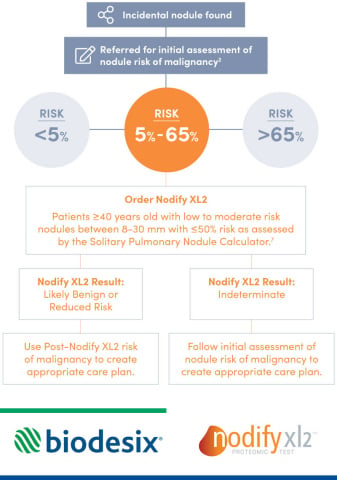Biodesix Advances ORACLE Registry for Lung Nodule Cancer Test
-Noninvasive Test to Rule Out Cancer Expected to Lower Patient Anxiety and Costs–
BOULDER, Colo., Oct. 30, 2018 (GLOBE NEWSWIRE) Biodesix® today provided an update on the Observational Registry study to evaluate the impact of BDX-XL2 on physician decision making in routine clinical use (ORACLE). The noninvasive test can aid clinicians in ruling out cancer through a blood sample. In the U.S. 1.6 million incidental lung nodules are detected each year. The ORACLE study seeks to confirm the utility of this clinically validated test in a real-world environment. The registry has advanced to 10 sites across the U.S. since the publication of the clinical PANOPTIC trial data in CHEST, showing that the noninvasive test could reduce the number of unnecessary invasive procedures carried out for patients with benign nodules. Data also show that the test could lead to a 40 percent reduction in unnecessary procedures which may reduce the overall cost of care associated with lung nodule management, and lower patient anxiety.
Michael Pritchett, DO, MPH a pulmonologist at Pinehurst Medical Clinic and Director of the Chest Center of the Carolinas at FirstHealth Moore Regional Hospital in North Carolina, is one of the investigators for the ORACLE study and was the first to start enrolling patients. “Use of low-dose CT scans in patients at risk of lung cancer has led to an increase in the identification of pulmonary nodules. However, the majority of the nodules found will be benign. The ability to effectively evaluate the risk of malignancy through a blood test will make a positive impact on the lives of patients facing a potential lung cancer diagnosis and will help efficiently triage patients to the most appropriate course of action. The BDX-XL2 test from Biodesix is a significant step forward in fulfilling a critical unmet need and may help to avoid unnecessary invasive procedures.”
The test is easily obtained from a noninvasive blood draw and is designed to identify low-to-moderate risk patients with a likely benign lung nodule. The test integrates plasma proteins with clinical risk factors associated with lung cancer. In the prospective, multicenter observational PANOPTIC trial, the test identified likely benign nodules with high sensitivity (97%) and high negative predictive value (98%). These data are superior to a PET scan or other pretest prediction models.
“The ORACLE study is critical to understanding how BDX-XL2 impacts treatment decisions in a real-world environment, and a top priority for Biodesix,” said David Brunel, CEO for Biodesix. “We are committed to providing tools to physicians and patients across the continuum of lung cancer care.”
Topics: Press Releases

